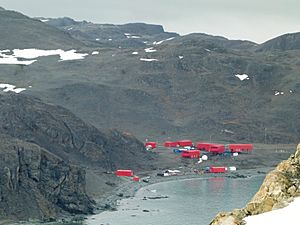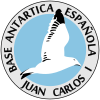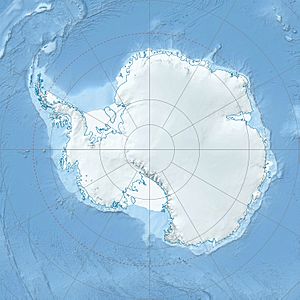Juan Carlos I Antarctic Base facts for kids
Quick facts for kids
Juan Carlos I Station
Base Antártica Española Juan Carlos I
|
||
|---|---|---|
|
Antarctic base
|
||

The all-new facilities of Juan Carlos I Base in 2011.
|
||
|
||
| Country | ||
| Location in Antarctica | Hurd Peninsula Livingston Island South Shetland Islands |
|
| Administered by | Spanish National Research Council | |
| Established | 8 January 1988 | |
| Named for | Juan Carlos I | |
| Elevation | 12 m (39 ft) | |
| Population
(2017)
|
||
| • Summer | 27 | |
| • Winter | 0 | |
| Type | Seasonal | |
| Period | Summer | |
| Status | Operational | |
| Activities |
List
Climatology
Geocryology Geodesy Geomorphology Glaciology Limnology Hydrology |
|
| Website | Consejo Superior de Investigaciones Científicas (CSIC) | |
The Juan Carlos I Antarctic Base is a science station in Antarctica. It is named after Juan Carlos I, who used to be the king of Spain. This base is run by Spain and is only open during the Antarctic summer, from November to March. It first opened in January 1988.
The base is located on Hurd Peninsula on Livingston Island, which is part of the South Shetland Islands. The Marine Technology Unit of the Spanish National Research Council controls the base. It is about 20 miles away from another Spanish Antarctic base called Gabriel de Castilla Base.
The Juan Carlos I Base has been updated several times. The most recent big renovation finished in 2018. Spain's Science Minister, Pedro Duque, officially opened the new parts on February 2, 2019. These new facilities have made the base much bigger. It can now hold up to 51 people and has more space for scientists and technical staff to work in laboratories.
Where is the Base Located?
The base sits on the coast of Española Cove, which is in South Bay. It is at the bottom of Mount Reina Sofía. The base is also about 2.7 kilometers (1.7 miles) south-southwest of the Bulgarian base, St. Kliment Ohridski.
The two bases are connected by a 5.5-kilometer (3.4-mile) path. This path goes across Johnsons Glacier, through Charrúa Gap, over Contell Glacier, and past Krum Rock.
What Kind of Science Do They Do?
Scientists at Juan Carlos I Base study many different things. They look at the weather and climate (climatology). They also study frozen ground (geocryology) and the Earth's shape and features (geodesy and geomorphology).
Other important studies include glaciers (glaciology), freshwater lakes and ponds (limnology), and how water moves across the land (hydrology). All these studies help us understand Antarctica better.
See also
 In Spanish: Base Antártica Juan Carlos I para niños
In Spanish: Base Antártica Juan Carlos I para niños
- Gabriel de Castilla Base
- List of Antarctic research stations
- List of Antarctic field camps
- Livingston Island
- Camp Byers
Gallery
 | Emma Amos |
 | Edward Mitchell Bannister |
 | Larry D. Alexander |
 | Ernie Barnes |






